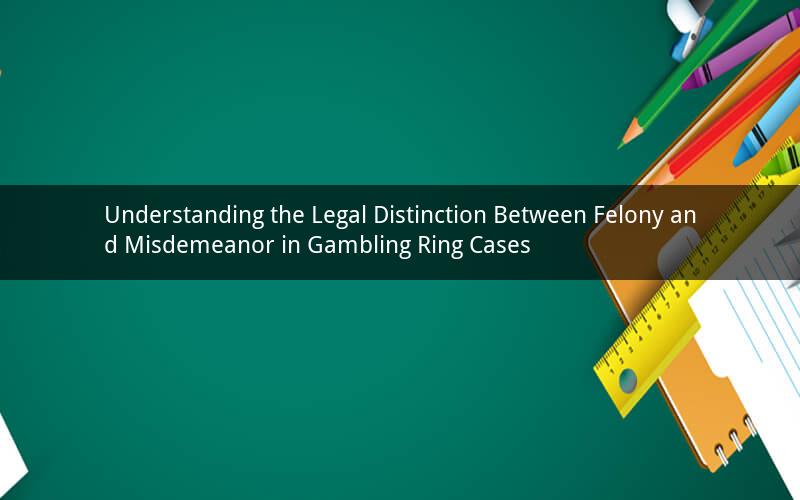
In the realm of gambling, the involvement in a gambling ring can lead to serious legal consequences. The question often arises whether such involvement constitutes a felony or a misdemeanor. This article delves into the legal distinction between the two, shedding light on the complexities surrounding gambling ring cases.
I. Definition of Felony and Misdemeanor
To understand the legal implications of being involved in a gambling ring, it is crucial to define the terms "felony" and "misdemeanor."
1. Felony: A felony is a serious crime that is considered more severe than a misdemeanor. It typically involves more significant punishment, such as imprisonment for more than one year. Felonies often involve serious harm to individuals or society, such as violent crimes, drug trafficking, or certain types of fraud.
2. Misdemeanor: A misdemeanor is a less severe offense compared to a felony. It usually involves penalties such as fines, community service, or short-term imprisonment (usually less than one year). Misdemeanors often include minor offenses, such as public intoxication, minor drug possession, or disorderly conduct.
II. Legal Distinction in Gambling Ring Cases
Now let's explore the legal distinction between a felony and a misdemeanor in gambling ring cases.
1. Felony Charges: In many jurisdictions, involvement in a gambling ring is considered a felony. This is because gambling rings are often associated with organized crime and involve illegal activities that pose a significant threat to society. Felony charges for gambling rings may include:
- Running a gambling ring: Organizing, operating, or participating in an illegal gambling operation.
- Racketeering: Engaging in a pattern of illegal activities, including gambling, to gain financial advantage.
- Money laundering: Hiding or transferring funds obtained through illegal activities, such as gambling.
2. Misdemeanor Charges: While most gambling ring cases are treated as felonies, there may be instances where the charges are reduced to misdemeanors. This can occur when the scale of the gambling operation is relatively small, and the severity of the illegal activities is less significant. Some factors that may lead to misdemeanor charges include:
- Smaller-scale gambling operations: Involvement in a small-scale gambling ring that does not involve organized crime or significant financial gain.
- First-time offenders: Individuals who are charged with gambling-related offenses for the first time, without any prior criminal history.
III. Penalties for Felony and Misdemeanor Charges
The penalties for felony and misdemeanor charges in gambling ring cases can vary depending on the jurisdiction and the specific circumstances of the case. Here are some general guidelines:
1. Felony Penalties: Felony charges for gambling rings often result in severe penalties, including:
- Prison sentences: Imprisonment for more than one year, depending on the severity of the offense.
- Fines: Significant monetary penalties imposed on the defendant.
- Probation: Supervised release after serving a portion of the sentence, with certain conditions and restrictions.
2. Misdemeanor Penalties: Misdemeanor charges for gambling-related offenses may result in less severe penalties, such as:
- Fines: Monetary penalties imposed on the defendant.
- Probation: Supervised release with certain conditions and restrictions.
- Community service: Performing a specified number of hours of unpaid work for the benefit of the community.
IV. Defenses and Legal Strategies
Defending against charges of involvement in a gambling ring requires a thorough understanding of the law and the specific circumstances of the case. Some potential defenses and legal strategies include:
1. Lack of knowledge: Arguing that the defendant was unaware of the illegal nature of the gambling ring.
2. Entrapment: Claiming that law enforcement officers induced the defendant to commit the crime through coercion or deception.
3. Insufficient evidence: Challenging the prosecution's case by arguing that there is insufficient evidence to prove the defendant's guilt beyond a reasonable doubt.
4. Mistaken identity: Asserting that the defendant was mistakenly identified as a participant in the gambling ring.
V. Conclusion
Involvement in a gambling ring can lead to serious legal consequences, as it is often considered a felony. However, there may be instances where the charges are reduced to misdemeanors, depending on the scale of the operation and the specific circumstances. Understanding the legal distinction between felony and misdemeanor charges in gambling ring cases is crucial for those facing such allegations. Legal representation from a knowledgeable attorney is essential in navigating the complexities of these cases.
Questions and Answers:
1. Q: What is the primary difference between a felony and a misdemeanor?
A: The primary difference lies in the severity of the offense. Felonies are more serious crimes with harsher penalties, while misdemeanors are less severe offenses with lighter penalties.
2. Q: Can involvement in a gambling ring ever be considered a misdemeanor?
A: Yes, in some cases, involvement in a gambling ring may be reduced to a misdemeanor, particularly if the scale of the operation is small and the severity of the illegal activities is less significant.
3. Q: What are some potential defenses against gambling ring charges?
A: Potential defenses include lack of knowledge, entrapment, insufficient evidence, and mistaken identity.
4. Q: Can a person charged with a gambling ring be released on bail?
A: Whether bail is granted depends on the jurisdiction and the specific circumstances of the case. If the court determines that the defendant poses a low risk of flight or reoffending, bail may be granted.
5. Q: How long can a person expect to serve in prison for a gambling ring felony?
A: The length of the prison sentence for a gambling ring felony can vary widely depending on the jurisdiction and the severity of the offense. Sentences can range from a few years to life imprisonment.